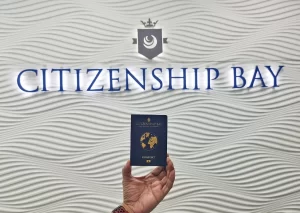The local slang ‘japa’, which means a strong desire to emigrate without a future plan of returning to the country, has dominated the tongue of young Nigerians. World Bank says that 50% of young Nigerians want and are making active steps to immigrate from the country[1], and many young people are leaving the country to live, study, work, invest and avail of the privileges granted by nations that offer citizenship. Professionals are also emigrating due to the shortage in appealing work benefits and security in Nigeria[2].
Reasons second citizenship is crucial for Nigerians?

Seeking social, economic stability
A second citizenship has become as valuable as a life insurance policy for successful Nigerians since they can benefit from social and political stability in countries providing citizenship programs. Nigeria has been suffering from security issues, and social rifts for over a decade, although several operations have been taken by the Nigerian government to reach a sincere solution.
Growing economies, developed infrastructure

Nigerian investors who are looking to expand their operations and open a new business abroad, can take advantage of the massive opportunities in countries providing citizenship by investment. Nigeria’s economy has been growing at a soft pace in the previous years[3], and inflation, which is one of the highest in world, is likely to increase further eating into consumers’ pockets. However, making business in new potential markets can offer direct access to millions of new patrons as well as political and economically stable business environment, and global trading.
Nigerian investors, who are suffering from a huge infrastructure deficit, power supply issues that jeopardize activity, can take advantage of the well-developed infrastructure in countries providing citizenship by investment programs.
Diversified investments
Nigerians looking to diversify their investments in tourism, technology, and services can benefit from the advantages of the second citizenship, especially that Nigeria’s economy relies on the oil industry for the majority of its fiscal income and foreign exchange profits. Nigerians can benefit from citizenship programs provided by Caribbean countries, such as Dominica, St. Kitts and Nevis, Antigua and Barbuda, Grenada, and Saint Lucia, as well as some European countries like Portugal and Greece, to invest in lucrative sectors including hospitality and tourism, real estate, and renewable energy.
Additionally, they can benefit from the well-educated workforce, competitive cost levels, and global trade agreements signed for the free movement of goods and services. Acquiring a citizenship by investment can help Nigerians benefit from flexible financial services, a privilege which they lack in their homeland.
World-class healthcare, educational systems
Being a holder of a second citizenship gives Nigerians access to world-class healthcare systems, especially that there are substantial barriers to accessing health care in Nigeria. A growing problem to access healthcare is the shortage of health professionals across the nation. Another barrier is distance, and lack of equipment, essential drugs, or vaccines.
A second citizenship will also give Nigerians access to superb educational services, and better standard of universities. Despite the fact that elementary education is nominally free and obligatory, around 10.5 million of the country\’s children aged between 5 and 14 are not enrolled in schools. Only 61 percent of children aged 6 to 11 attend primary school on a regular basis, while only 35.6 percent of children aged 36 to 59 months receive early childhood education[4].
Global mobility
Applying for a visa may be a very difficult procedure. Many Nigerians are finding it harder to secure travel visas as global immigration regulations tighten. Nigerian businessmen whose operations rely on recurrent travel find this to be a major impediment. For instance, Nigeria has visa-free access to around 44 countries globally, but a Caribbean passport allows visa-free travel to more than 150 countries. This makes travel much easier with visa-free access to most of the developed world including the EU and UK. A European residence permit, on the other hand, will not only grant its holder the freedom of movement within Europe but also the ability to live, study, and work anywhere in European Union.
It is worth noting that several nations award citizenship without imposing any residence restrictions, thus new citizens are not obliged to live in the new country offering them its citizenship. This advantage is critical for Nigerian company owners who have built their own businesses and wealth in their homeland and find it hard to relocate to another country obtain a second passport.
Citizenship Bay Now Opens in Nigeria

Citizenship Bay has recently established an office in Lagos to offer its Nigerian clients personalized advisory services, and welcome anyone looking to explore citizenship and residency by investment opportunities for their families.
For more information required about obtaining a second citizenship by Investment, and the steps required, Please visit our website Citizenship Bay.
References:
[1] https://venturesafrica.com/nigerias-japa-syndrome-has-a-new-catalyst-tech/
[2] https://www.thecable.ng/nigerian-youths-and-the-japa-syndrome/amp
[3] https://www.focus-economics.com/countries/nigeria

